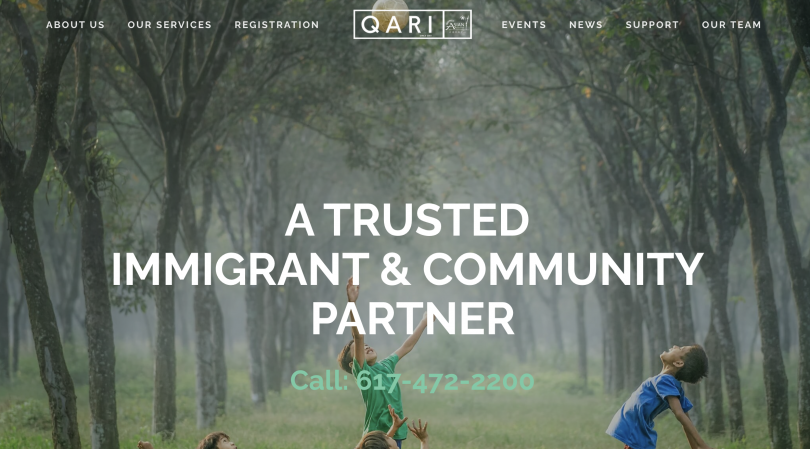By Mia McCarthy
Boston University News Service
BOSTON – When David Zou immigrated from China to Quincy in 1983, he spoke no English. Back then, he said Quincy had a small Asian population; this meant he had to go to Boston’s Chinatown for most things.
“Test prep, haircut, lawyer, groceries — I had to go to Boston,” Zou said. “There was no service for me [in Quincy].”
Now as a fluent English speaker, a founding board member of Quincy Asian Resources Inc. and one of almost 30,000 Asian families in Quincy, Zou helps other Asian immigrants on the South Shore with translating documents and work in individuals’ English classes.
“It’s a very difficult process to get settled down,” Zou said. “I wish there had been an organization then that could help me.”
Language barriers are an ongoing issue for Quincy’s Asian immigrant community. They have become a growing concern for Quincy officials surrounding a legislative proposal to build trust with Massachusetts’ immigrants.
The Safe Communities Act is designed to “ensure no immigrant has to live in fear and everyone’s civil rights are protected equally,” according to State Sen. Jamie Eldridge, D-Acton, who wrote the bill almost 10 years ago. It was refiled on Feb. 2 and is cosponsored by State Rep. Liz Miranda, D-Boston, and State Rep. Ruth Balser, D-Newton.
The bill would prohibit asking someone about immigration status unless required by law. It would also require written consent before any ICE interview — with translation if necessary — among other provisions. Supporters hope it is passed soon in order to prevent immigration status from negatively impacting undocumented people from getting COVID-19 tests or vaccines.
“The Safe Communities Act will restore trust in our public institutions,” Michael Curry, president and CEO of the Massachusetts League of Community Health Centers, said during a press conference last week. “More urgently, as we roll out the COVID-19 vaccine, [this act will] ensure that our immigrant communities have access to this life-saving measure.”
But Rep. Tackey Chan, D-Quincy, one of the first Asian-American House members, said he fears this legislation could create more confusion among the immigrant community. He is also worried that the legislation may be unhelpful without the support of local authorities.
“While people talk about the Safe Communities Act, the reality of it is that if the local community does not engage immigrants — and frankly change how they do business with that community — [the Safe Communities Act is] pretty irrelevant,” Chan said.
According to Karissa Hand, interim communications director at the Massachusetts Immigrant and Refugee Advocacy Coalition, as well as a member of the coalition, the Safe Communities Act Coalition — a key advocate of the legislation — has attempted to address those concerns; they have created a fact sheet outlining the bill’s five principles in Spanish, Portuguese and Cape Verdean Creole.
The U.S. Census reports one-third of Quincy’s population is foreign born and 38.7% of its residents over the age of 5 speak a language other than English at home. Data from 2018 also showed that 85.2% of the city’s residents are United States citizens, lower than the state average of 92.2% and the national average of 93.2%.
The principal languages spoken in Quincy are English, Chinese and other Asian languages, according to the U.S. Census. Hand said in an email that the group is working to translate the document into as many languages as possible — a move Chan said is vital.
“You have to tell people about this stuff,” Chan said. “If you don’t read English what good does it do to you?”
The number of undocumented people in Quincy is unknown. Chan said ICE raids in Quincy are extremely rare. However, groups like Quincy Asian Resources Inc. know that undocumented individuals are present in the community; they realize that reaching these individuals is critical as vaccinations efforts ramp up.
“Right now, even documented people don’t know where to go to get the vaccine,” Philip Chong, Quincy Asian Resources Inc. president and CEO, said. “I know that lots of undocumented people before COVID [didn’t] seek medical help in many situations. That could be very serious [in terms of medical assistance in regard to COVID-19].”
Chong said that Quincy Asian Resources Inc. is already helping Quincy’s elderly immigrants find out how to get vaccinated. If it is passed, they will also provide translation for the Safe Communities Act.
Angie Liou, executive director of the Asian Community Development Corporation, said she believes the Safe Communities Act passage is “long overdue” and noted other areas where language barriers have become an issue.
“Last week, Quincy’s website had a quick website pre-registration form for the vaccine only in English,” Liou said. “We helped to add Chinese and Vietnamese in a few hours, but 800 people had already signed up.”
Chang relates to the difficulties Asian immigrants face. The struggles he and other Asian immigrants face has led him to not only understand the difficulty of immigrating to the United States, but the need for bettering the legislative system for the overall good of the country and the people living in it — undocumented and documented, alike.
“I personally can understand people who come into this country [and] want to pursue their dream but don’t have the documentation,” Chong said. “Whatever is [best] for the immigrants is [best] for this country. This country is an immigrant country.”
This article was previously published in The Patriot Ledger.




